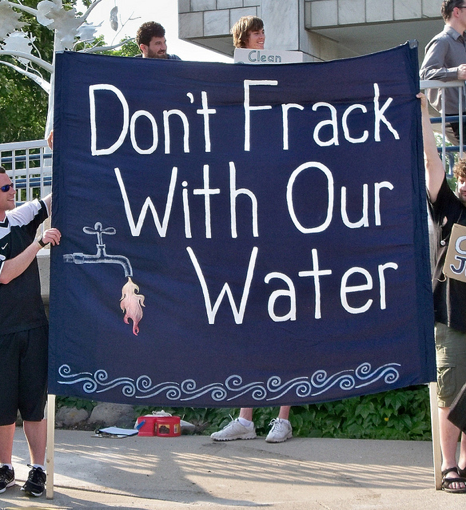Frackers continue illegal use of toxic diesel fuels

An environmental watchdog has discovered that natural gas drillers are continuing to use diesel fuels in fracking operations despite known health hazards -- and in violation of the Safe Drinking Water Act.
The West Virginia-based group SkyTruth analyzed a database of voluntary industry disclosures and found that diesel fuels were used in fracking on 448 separate occasions in 12 states between January 2011 and August 2012. Fracking involves injecting water and chemicals underground at high pressure to release natural gas from rock formations and has been linked to groundwater contamination.
Arkansas had the most frequent number of diesel uses for fracking at 171, followed by Texas at 142. SkyTruth also found instances of fracking with diesel in Alaska, Colorado, Kansas, Louisiana, New Mexico, North Dakota, Oklahoma, Pennsylvania, Utah and West Virginia. For a SkyTruth chart detailing the number of uses by state, click here.
"…[T]he ongoing disregard for the Safe Drinking Water Act is unacceptable, and must be addressed as soon as possible by both industry and our government regulators," SkyTruth wrote on its blog.
Because the term "diesel fuels" is not uniformly defined, SkyTruth relied on the Environmental Protection Agency's May 2012 draft permitting guidance for their use in fracking. The EPA definition of diesel fuels encompasses six types of petroleum distillates, including kerosene. All contain toxic chemicals including benzene, which is known to cause cancer, as well as toluene, ethylbenzene and xylenes, which can damage the nervous system, liver and kidneys.
The use of diesel fuels in fracking operations has long been a concern for federal regulators. In 2003, the EPA signed an agreement with the three largest fracking companies -- Halliburton, BJ Services, and Schlumberger, all headquartered in Houston -- to eliminate their use when fracking in coalbed methane formations, which tend to be closer to drinking-water sources than other types of gas reservoirs.
Two years later, Congress passed the Energy Policy Act that, as a result of provisions known as the "Halliburton loopholes" pushed by the Bush-Cheney administration on behalf of energy companies, largely exempted fracking from federal oversight under the Safe Drinking Water Act. Vice President Dick Cheney served as chair and CEO of Halliburton from 1995 to 2000. But even those industry-friendly loopholes made an exception that allowed for federal oversight of fracking with diesel fuels, since those can be particularly toxic.
Consequently, the EPA requires any company that uses diesel fuels in fracking to get a permit under the Safe Drinking Water Act. Since the agency still does not have a system in place to process such permits, there is effectively a ban on the practice.
However, companies engaged in fracking have disregarded the effective ban. In January 2011, three members of Congress -- Reps. Henry Waxman (D-Calif.), Ed Markey (D-Mass.) and Diana DeGette (D-Colo.) -- wrote a letter to EPA Administrator Lisa Jackson expressing concerns over ongoing use of diesel in fracking. Their own investigation found that oil and gas service companies injected 32.2 million gallons of diesel fuels or fracking fluid containing diesel fuels in wells in 19 states between 2005 and 2009. BJ Services injected 11.5 million gallons, while Halliburton injected 7 million gallons.
The good news is that the use of diesel fuels in fracking appears to be on the decline, with SkyTruth noting that the percentage of fracks reporting diesel dropped between January 2011 and August 2012. However, the group says "the ongoing disregard for the Safe Drinking Water Act is unacceptable, and must be addressed as soon as possible by both the industry and our government regulators."
Environmental advocates have said that while the EPA's effort to craft diesel-use guidance for frackers is a step in the right direction, it raises the problem of how to define diesel fuels. They argue that the EPA should simply ban the use of diesel in fracking. They also have called on the EPA to move beyond mere guidance with formal rulemaking -- and to enforce compliance in order to adequately protect drinking-water supplies.
(Photo by Toban Black via Flickr.)
Tags
Sue Sturgis
Sue is the former editorial director of Facing South and the Institute for Southern Studies.
